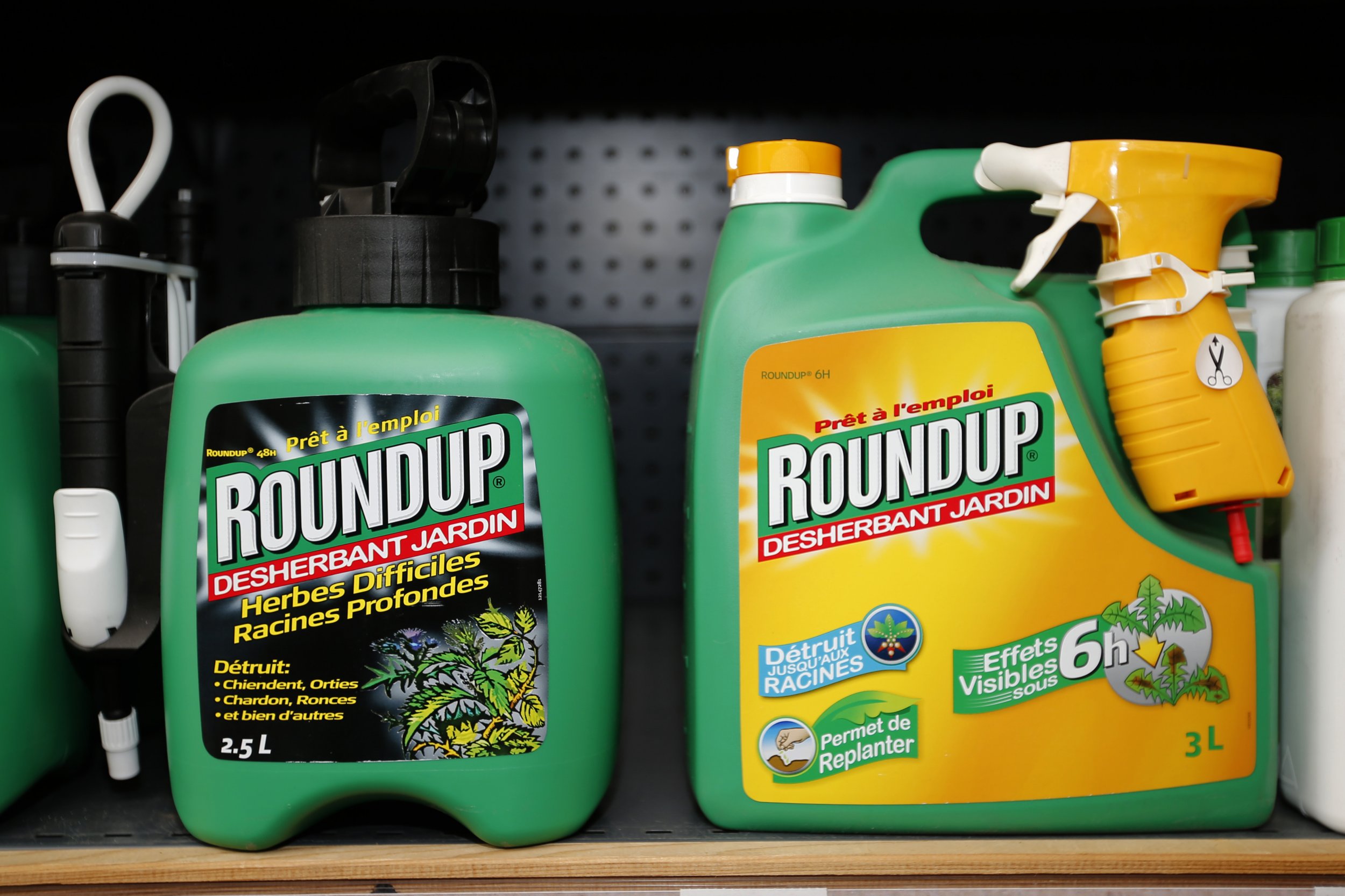
UPDATED | The world is awash in glyphosate, the active ingredient in the herbicide Roundup, produced by Monsanto. It has now become the most heavily-used agricultural chemical in the history of the world, and many argue that's a problem, since the substance comes with concerning albeit incompletely-determined health effects.
A study published Tuesday in the journal Environmental Sciences Europe reveals that Americans have applied 1.8 million tons of glyphosate since its introduction in 1974. Worldwide, 9.4 million tons of the chemical have been sprayed onto fields. For comparison, that's equivalent to the weight of water in more than 2,300 Olympic-size swimming pools. It's also enough to spray nearly half a pound of Roundup on every cultivated acre of land in the world.
Anyway you look at it, this is a staggering amount, says study author Charles Benbrook. And it's troubling, considering that in March 2015 the World Health Organization's International Agency for Research on Cancer unanimously determined that glyphosate is "probably carcinogenic to humans," says Bill Freese, a science policy analyst with the Center for Food Safety, who wasn't involved in the work. A carcinogen is a substance known to cause cancer.
Research has also shown that glyphosate is an endocrine disruptor, meaning that it interferes with the proper functioning and production of hormones, in human cell lines. It's not yet clear how much of an impact glyphosate has had on cancer rates.
Monsanto says that glyphosate does not pose a threat to humans. "Glyphosate safety is supported by one of the most extensive worldwide human health, crop residue and environmental databases ever compiled on a pesticide product," says a company spokesperson. "In evaluations spanning four decades, the overwhelming conclusion of experts worldwide has been that glyphosate, when used according to label directions, does not present an unreasonable risk of adverse effects to humans, wildlife or the environment."
More obviously, the mass-spraying of glyphosate has led to the explosion of resistant weeds, which have evolved to survive despite being sprayed. Already, weeds resistant to the herbicide are found on half of all American farmers' fields, and are present on upward of 100 million acres of cultivated cropland, Benbrook says.
"Anybody working in agricultural would say it's a very serious problem," says David Mortensen, a professor of weed and applied plant ecology at Penn State University.
Glyphosate was once only used on a small-scale, because while it is toxic to many weeds, it also kills many crops. However, in the 1990s, Monsanto began introducing genetically modified crops that were resistant to the herbicides, such as Roundup Ready corn and soybeans. Since then, its use has skyrocketed, increasing fifteen-fold since 1996. In 1987, only 11 million pounds of the chemical were used on U.S. farms, but now nearly 300 million pounds of glyphosate are applied each year.
At the same time, the U.S. Environmental Protection Agency has relaxed its rules about what it considers a safe level of glyphosate. Fifty times more glyphosate is allowed on corn grain now than in 1996, for example, Freese says. The agency has also increased what it considers a safe amount of glyphosate exposure by a factor of 17.
Freese adds that EPA's high-end estimate of infant exposure to glyphosate exceeds the level the Agency considered safe for them in 1983.
The rise of glyphosate-resistant weeds has led to the use of yet more herbicides. And companies like Dow AgroSciences are developing crops that are resistant to even more herbicides, such as 2,4-D. But this will just lead to spraying of even more herbicides, more resistance in the future and the need for more herbicide-resistant crops in the future, Mortensen says. It's a vicious cycle.
"This is what you call a transgenic treadmill, using ever more herbicides and selecting for greater and greater resistance in weeds, and we are already seeing this happen," Freese says.
Furthermore, it is robbing farmers of income, which is diverted to companies that produce herbicides and herbicide-resistant crops like Monsanto's Roundup Ready corn and soybeans. "The bottom line is that at least 30 percent of the net income that used to go to farmers is now going to [these companies]," Benbrook says, and it continues to get worse.
That's frustrating to weed scientists like Mortensen, who knows that there are ways to combat crops without using quite so much herbicide. For example, the use of winter cover crops like wheat can reduce the amount of weeds that grow in the spring, with the additional benefit of reducing erosion and improving water quality, he says. Tillage and more careful use of select herbicides can also greatly reduce the dependence on glyphosate, Mortensen says.
Continuing to rely on glyphosate to control weeds "is going to be a dead end," Freese says.
Correction: A previous version of this article stated that glyphosate's use has increased fiftyfold since 1996. In fact, the chemical use has increase fifteen-fold since 1995. The article also incorrectly stated that infants are now exposed to levels of glyphosate considered unsafe in 1985. That year is incorrect; it is actually 1983.
Update: This article was updated to include a comment from Monsanto.
Uncommon Knowledge
Newsweek is committed to challenging conventional wisdom and finding connections in the search for common ground.
Newsweek is committed to challenging conventional wisdom and finding connections in the search for common ground.
About the writer
Douglas Main is a journalist who lives in New York City and whose writing has appeared in the New York ... Read more
To read how Newsweek uses AI as a newsroom tool, Click here.








